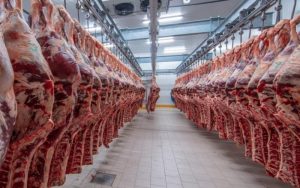By Valerie Elliott, The Telegraph
Until now the British Veterinary Association has campaigned for an outright ban on the ‘cruel practice’ of religious slaughter
 Meat obtained from animals that were not stunned prior to being killed must be labeled, according to the British Veterinary Association (BVA).
Meat obtained from animals that were not stunned prior to being killed must be labeled, according to the British Veterinary Association (BVA).
Without new labeling rules, consumers run the risk of inadvertently eating meat from animals that are in “unnecessary pain” before they die.
So far, the BVA, which represents 18,000 veterinarians, has campaigned for a complete ban on the “cruel practice” of religious slaughter, in which live animals are killed with a sharp knife before they can bleed to death.
A ban remains its goal, but the professional organization has taken a new, pragmatic approach as it believes it has a better chance of convincing ministers to adopt “No Stun” labels.
James Russell, new BVA President, said: “Our concern is that every animal can lead a good life with the highest level of well-being until it dies.
“But we don’t know the target of meat from some of these animals, which are killed without anesthesia, and we believe it should be labeled.
“We don’t know where fresh meat for sale at counters and butchers comes from, and we don’t know whether some cakes, ready meals or other meat products use meat without anesthesia.”
Meat sold under certified safety labels such as Red Tractor, Quality Meat Scotland, RSPCA Assured and Soil Association requires animals to be stunning before slaughter.
However, since there is no legal obligation to label this meat, it is unclear how much meat from non-stunned animals goes on sale.
However, a report from the Food Standards Agency last year suggested some would step into the broader food chain.
Dr. Amir Masoom, CEO of the Halal Food Authority, who supported the BVA, said: “We want all Halal meat and meat products to be labeled as“ stunned ”or“ non-stunned ”so that consumers can make an informed choice when shopping in stores can meet. ”
While Schechita UK, which represents the Jewish community, supports consumer rights, spokesman Shimon Cohen criticized the proposed labeling as “one-dimensional”.
He said: “If consumer information is the target, consumers should be informed about the method of stunning the slaughter – captive bolt shooting, gas asphyxiation, electrocution with pliers or an electric water bath, or other permitted methods, including Jewish and Muslim Slaughter. ”
The Ministry of Environment, Food and Rural Affairs said: “We respect the right of Jewish and Muslim communities to eat meat cooked according to their beliefs and we expect the food industry to provide consumers with all the information they need, to make informed decisions.
“The government is committed to seriously and rapidly examining the role of labeling in promoting high standards of food and animal welfare in the UK market and to consult this at the end of the transition period.”



